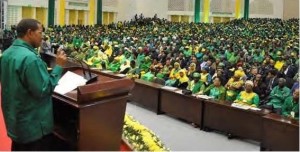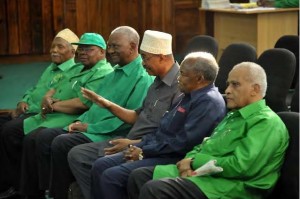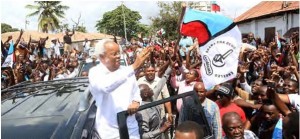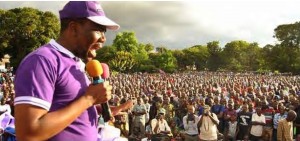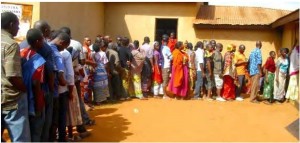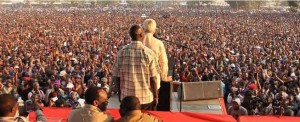by David Brewin
As the elections approached, during the last two weeks of July and the first two weeks of August 2015, Tanzanians witnessed some very dramatic changes on the political scene. Some sections of the media were even calling the events “Tanzania’s Tsunami!”
What happened? A summary
1. In July as all the political parties were having difficulty in choosing their candidates for the presidency, the ruling Chama cha Mapinduzi (CCM) party decided to steal a march on the others by bringing forward their own selection process and forcing the other parties to do the same.
2. It seemed as though almost everyone who is anyone wanted to become president. A total of no less than 42 CCM leaders, an unprecedented number, registered their desire to stand. They included former prime ministers and ministers and many other prominent CCM officials.
3. Meanwhile, members of the CCM hierarchy were gathering in Dodoma to begin the lengthy and highly competitive selection process.
4. The person who appeared to have the best chance of winning for the CCM was former Prime Minister Edward Lowassa MP, who was popular in the party and had been campaigning hard. However, amidst strong protests from his many supporters, he was rejected as a candidate by the CCM Party’s Ethics and Security Committee during the selection process. Protests from his supporters began immediately.
5. The CCM then chose as its new leader and presidential candidate Dr John Magufuli. He was described as “relatively unknown,” although he was, at the time, Minister of Works in the CCM government.
6. The CHADEMA party saw the chance of having a really well known candidate as its leader and, to astonishment all round, Lowassa suddenly resigned from the CCM and accepted CHADEMA’s invitation to become its new leader and hence its presidential candidate. All this happened very quickly. Lowassa had been a forceful critic of CHADEMA (and vice-versa) for many years and now he found himself as the party’s leader! This confirmed that Tanzanians, like many other voters around the world, often choose their governments on the basis of personality rather than policy.
7. In the previous elections, in 2010, CHADEMA’s presidential candidate had been the party’s Secretary General, Dr. Willbrod Slaa. He got a surprisingly good result with 2.2 million votes (23.64%) while the winner, President Jakaya Kikwete, got 5.2 million votes (61.7%). Thinking that there was plenty of time Slaa arranged to visit Britain in July this year, presumably to mobilise the Tanzanian diaspora to his side but he had to cancel the visit and hurry back to Dar Salaam to look after his political interests there. Then arrived the news about Lowassa which must have shocked him. He disappeared from the public eye for a few days before emerging to say that he had resigned from CHADEMA and, apparently also from politics altogether!
8. Similarly, Lowassa’s move to CHADEMA has affected other parties in the opposition UKAWA coalition. Professor Ibrahim Lipumba, national chairman of CUF and the party’s previous presidential candidate, has also decided that he was not comfortable sharing a platform with Lowassa. Like Dr Slaa, he has resigned both from his leadership position and apparently from active politics.
The CCM selection process
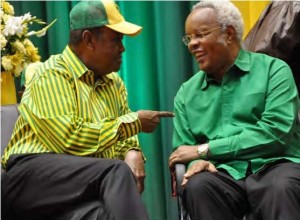
CCM Secretary General, Abdulrahman Kinana, with Edward Lowassa at the party’s National Convention in Dodoma, prior to Lowassa switching to CHADEMA.
The first step in the election/selection process in the CCM (the other parties have similar processes) was to reduce the field from the 38 candidates who returned their nomination papers, down to only five.
This is the function of the party’s Central Committee (CC). The first job was to eliminate persons with criminal records or corrupt behaviour and the CC was also expected to look into whether the candidate’s heart was aligned with that of the party. Other considerations were the education and professional conduct of the candidates.
The five they chose were Minister for Foreign Affairs and International Cooperation, Bernard Membe; Deputy Minister for Science and Technology, January Makamba; Minister for Works, John Magufuli; Minister for Justice and Constitutional Affairs (and former UN Deputy Secretary General) Dr Asha Rose-Migiro; and the little-known African Union Ambassador to the UN, Amina Salum Ali.
The National Executive Committee then cut the list down to three – leaving out Bernard Membe and January Makamba.
Prior to the shortlisting, the Ethics and Security Committee of the party, which comprises a small number of party officials and other senior CCM personnel, along with “the elders” – the party’s former leaders – met behind closed doors and rejected the candidacy of Edward Lowassa. This caused a storm of objections from his supporters. Outside the hall a group of youths started chanting “We need our Lowassa,” and “Bring back Lowassa,… we trust him and if it wasn’t for him Kikwete would not be the President today.”
In the final stage, Dr John Magufuli obtained 2104 (87%) of the votes and beat his two challengers Ambassador Amina Suluhu Ali who got 253 votes and Dr Asha Rose-Migiro who got 59.
Biographies of the candidates
CCM Presidential candidate: Dr John Pombe Magufuli (55)
Dr Magufuli hails from the Geita gold-mining region south of Lake Victoria. He is a chemist with a Masters degree from Salford University UK and a PhD from Dar es Salaam University. He has gained a reputation as a competent technocrat with a good head for statistics. He worked as both a teacher and an industrial chemist before becoming an MP in 1995 when he was immediately appointed Deputy Minister of Works. He has held a variety of portfolios since that time and has quietly built a reputation for completing projects successfully and for not tolerating under-performing officials.
After Magufuli’s victory, according to the account in Africa Confidential, delegates decked in the CCM colours of green and yellow erupted into thunderous applause at the Jamhuri Stadium in Dodoma when he made a light-hearted remark: “To all irresponsible leaders, thieves and corrupt officials please be informed that I will deal with you in a very polite way”.
The choice of Magufuli came as a surprise to most people. However, according to the media, former President Benjamin Mkapa had quietly pushed for his candidacy having recruited him as Deputy Minister of Works when he became president in 1995.
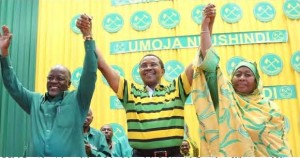
CCM Presidential candidate, John Magufuli (left), with President Kikwete and Vice-Presidential candidate, Samia Suluhu Hassan
As Africa Confidential said in its July 24 issue, CCM is counting on the fact that Magufuli’s name is less associated with corruption or rumours of it than many of his original rivals for nomination, including Lowassa.
After his election there were many comments. The National Chairman of the small United Democratic Party (UDP) Mr John Cheyo, described him as a hardworking person with a good track record. His work in several ministries had made him widely acceptable while his no-nonsense stance would restore hope among many. However, Singida East MP Tundu Lissu (CHADEMA) had nothing positive to say about him. “Whoever comes out of muddy water is also dirty,” he asserted.
President Kikwete said “I am proud of our candidate. He is a very hardworking man and I am certain that he will be the best possible president. He is a no-nonsense man. We hope he will help the country to conquer poverty, fight graft and indiscipline.”
Magufuli himself said “I am profoundly overwhelmed by the results but I promise to give the CCM a resounding victory in October. I also promise to serve all Tanzanians to the best of my ability in line with the law of the land and the spirit of good governance”.
CCM Vice Presidential Candidate: Ms Samia Suluhu Hassan (55)
As his running mate Dr Magufuli named Ms Samia Suluhu Hassan for the Vice Presidential position. She comes from Zanzibar, in line with the country’s constitution that stipulates that if the President comes from the mainland the Vice President must be from Zanzibar.
Ms Hassan is the MP for Manyovu and has worked her way up from the ranks of a government typing pool, after taking a Masters degree in the United States, to her present elevated position.
She had been picked, said Magufuli, because she was a Zanzibari who understood the challenges facing the Union, having worked closely with the team addressing Union issues for almost a decade. Explaining further his choice of Ms Hassan, Dr Magufuli said that it was because of the trust he has in women’s abilities and commitment. He revealed that his political mentor, when he was appointed Deputy Minister for Works ten years earlier, was a woman – Ms Anna Abdullah – who had helped him greatly.
The CHADEMA presidential candidate: Edward Lowassa (61)
Mr Lowassa took his BA degree at the University of Dar es Salaam in 1977. In 1978 he was drafted into the army and fought in the Kagera War between Tanzania and Uganda. He later took an MSc in Development Studies from the University of Bath. His first major job was as a Minister of State in the Vice President’s office.
His career thereafter can be summed up as “up, down and up again”. He continued as a hardworking minister but in 2005 he decided not to seek the CCM presidential nomination but became instead a key campaigner for his long term friend Jakaya Kikwete in his bid for the presidency. He helped Kikwete to win and in return President Kikwete made him Prime Minister. He was up again.
Then, in 2008, he was down because he was alleged to have been involved in the Richmond energy scandal and decided to resign from the prime ministership even though he vigorously rejected the suggestion that he might have benefitted personally. Lowassa insisted that he was not guilty of corruption and was merely doing what he had to do as Prime Minister and arrange for an appropriate series of enquiries into the scandal.
In the 2010 elections he won his seat in parliament for Monduli with a huge majority and was up again. As the 2015 election approached, he had become the favourite to win the CCM nomination.
After his selection as CHADEMA candidate and leader of the main opposition party, he claimed to have been rapidly endorsed by 1.6 million CHADEMA members from 32 regions. The party’s Deputy Secretary General (Zanzibar) Salum Mwalimu said the signatories were just the “initial capital” that would assure Mr Lowassa of massive support during the October 25 poll.
The emergence of UKAWA
In a move towards consolidation of the opposition parties and arising from the unresolved differences between the government and the opposition on the proposed new constitution (the referendum scheduled for mid-2015 has been postponed indefinitely) a new party grouping has emerged. UKAWA is the acronym for Umoja wa Katiba ya Wananchi or the “Movement for People’s Constitution.” It is not a legal entity but has proved remarkably successful in holding together the different parties which have wisely come together to oppose the CCM. The group comprises CHADEMA and CUF plus two smaller parties, NCCR Mageuzi and the National League for Democracy.
These parties have agreed to field a single Presidential candidate – Edward Lowassa – and a single candidate for the parliamentary seat in each constituency, with the constituencies divided up in an agreement between the leaders of each party.
ACT-Wazalendo – Zitto Kabwe (39) and Anna Mghwira (56)
While all this was going on the ambitious and fiery Zitto Kabwe MP, who is admired by many for the energy and determination he has put into his fight against corruption, tried to decide what to do.
He had joined CHADEMA at 16 while studying for a degree in economics in Dar and then in 2010 took a Masters degree in law and finance from a German university.
He became MP for Kigoma North in 2005 and rose rapidly. He became Chairman of the influential Public Accounts Committee of the National Assembly and also brought together MPs from different parties to review the mining industry. They devised a new law which became the Mining Act 2010 which made major changes in policy. The East African described him as the “One man Backbench.” Although he was appointed as No 2 in his party he chafed against the CHADEMA leadership and eventually resigned from the party.
He then found a new home in a new party – the Alliance for Change and Transparency (ACT-Wazalendo) and became its leader, He started to develop the party so that it could take a major role in the October elections and talked about having over 200 candidates.
He clearly intends to stand for the presidency himself in future, but is barred in 2015 as he is just below the minimum age of 40.
Instead, ACT-Wazalendo has nominated their party chair, Anna Mghwira (56), as their presidential candidate. She becomes the only female presidential candidate on this year’s ballot paper.
Party policies
The subject of party or individual policies was hardly discussed at all during the fight for the CCM presidential candidacy. People asking questions were usually told to wait for the party manifestos which would explain all.
Who will win? Lessons from the local elections
One guide as to what might happen in the November elections is the result of the nationwide local elections which were held in December 2014. The results favoured the CCM as they have done in every election since independence. CCM won comfortably in seat after seat in rural areas but did less well in some urban areas where CHADEMA made advances.
There were many irregularities, mainly connected with a failure to deliver election documents in time, late opening of voting centres, late delivery of ballot papers and some mixing up of names.
The government admitted that these local elections had been flawed in at least 13 regions and put the blame on officials in district councils.
The Ministry of Local Government, which was responsible for the administration of the elections, said that it was the responsibility of the regions to submit reports explaining what had happened in their areas. As a result of cases of mismanagement of the local elections, six district executive directors were sacked and 11 others were subjected to various disciplinary measures.
The government plans to make the National Electoral Commission manage local elections in the future.
Some local election results
Amongst the published local election results were the hotly contested Arusha Region where CHADEMA got 75 neighbourhoods and CCM 73. In Mtwara CCM won in 58 seats and the opposition won 53. In Shinyanga Municipality the opposition won 29 seats and CCM 26 but, in the rest of Shinyanga Region CCM won 65 seats and the opposition parties won 18. In Mwanza Region CCM won in 96 seats, CHADEMA got 70 and CUF took 7.
As an indication of the way in which voters in coastal areas voted, the favoured opposition party was often CUF and not CHADEMA. In Tanga Region for example CCM won 118 seats, CUF 60 and CHADEMA only 2.
In Dodoma Region, always a CCM stronghold, it won with over 90% of the seats. In Bukoba Region, in Muleba District, out of 164 villages CCM got 89 and CHADEMA 70. In Bukoba Municipality out of 66 seats, CCM won 35, CHADEMA 29 and CUF won 2. Before the elections CCM had been holding 55 seats.
If the results from the local elections are followed by similar trends in the national elections in October, CCM seems likely to retain power. However, the voting population now includes larger numbers than before of young people, most of whom tend to support opposition parties.
Zanzibar
In Zanzibar things are different, as they have always been. This time there could be again a fierce battle between CCM and CUF and, if there are signs that CCM may not win, the CCM party could take drastic measures.
The opposition CUF party, the leader of the party in Zanzibar, Seif Shariff Hamad, and its (former) national (Tanzanian) leader, Professor Lipumba, have tried several times before to win but each time have been beaten by CCM often with very small majorities.
Virtually all the elections in Zanzibar since independence have been troublesome. Some of the more observant international observers have alleged breaches of the rules including both a rigging of the voter registration process and the involvement of non-Zanzibaris in voting in certain key seats.
Zanzibar has a history of electoral violence and some people died during the 1995 and 2005 elections. The formation of a government of national unity with ministers from CCM and CUF working together for the last three years has brought some stability and less tension to the Isles.
The candidates in Zanzibar
CCM has chosen the existing President, Dr Ali Mohammed Shein, as its candidate for the presidency of Zanzibar and CUF has again chosen its Secretary General Seif Sharif Hamad.
For the first time, Hamad, has called openly for the Isles to secede from the Tanzanian Union. “We are only getting 4.5% of the total budget instead of 11.5%. That is why we are saying the Union is not helping us. We could sit down however and agree areas where we could cooperate.”
Registration of Voters
The introduction of new Biometric technology ahead of the October 25 elections appears, despite many delays and numerous other problems during the process, to have been rolled out very successfully. The National Electoral Commission said that just over 24 million Tanzanians aged 18 and over had registered, which was a remarkable achievement. The figure was only about 300,000 short of the total number of eligible voters as estimated by the National Bureau of Statistics.
Who will win?
The fight between the main candidates for the presidency of Tanzania seems likely to be a titanic struggle.
On the one hand there is John Magufuli, backed by the massive CCM Party “steamroller” with its representatives in almost every street and lane in the country and which has won every national election in the United Republic since independence.
On the opposition side there is Edward Lowassa, meaning that the opposition will be represented by a leader of greater national prominence than ever before, and considerable popularity. Lowassa officially represents CHADEMA, but the other parties in the UKAWA coalition are backing him and will not put forward presidential candidates. As such, the opposition vote is likely to be united as never before. If this group remains intact until the election it could do much better than many expect.
The effect of the presence of a new very small party, ACT-Wazalendo which has huge support amongst young voters remains to be seen
At the time this edition of TA went to press there was no clear indication about how many MPs and other CCM leaders would follow Mr Lowassa in defecting to CHADEMA. It is likely that some regional level CCM officials will switch sides, and possibly some CCM members who lose out in the race for the party’s nomination as parliamentary candidates. But it also appears than none of Lowassa’s more prominent supporters in the 2010-2015 parliament and cabinet have followed him, though there is still time for this to change – just another complicating factor in trying to determine who will win.
STOP PRESS
As this edition of TA went to press other sensational news arrived from Tanzania.
Lowassa’s stance on Tanzania’s constitution
In a major policy reversal, Lowassa and the UKAWA parties have announced that they will, if elected, radically change Tanzania’s proposed new constitution. President Kikwete and the CCM government have insisted that the present government of two parts (one government for the Union and another for Zanzibar) as laid down by Father of the Nation Julius Nyerere in the 1960’s, must be continued. The highly controversial alternative – one small government for Tanzania, a large one for the mainland and a small one for Zanzibar – as proposed by Judge Warioba when he presided over the preparation of the new constitution and now backed by Lowassa, could have a major effect on the election results. Many, especially in Zanzibar, strongly favour giving greater independence to the islands. Others contend that the change could prove very expensive and lead to the end of the Union between the mainland and Zanzibar.
Mbowe health scare
Mr Freeman Mbowe, Chairman of CHADEMA was rushed to hospital in mid-August suffering from fatigue and exhaustion. He responded well to treatment and was released two days later.
Policing the campaign
At a meeting of the Mwalimu Nyerere Foundation in Dar, fears were expressed that the police were working in favour of CCM and against the opposition. It was reported that they had used tear gas to clear the Arusha-Moshi Road when a crowd had blocked it demanding that Lowassa should be able address them. Police in Mwanza were also reported as having used tear gas to disperse CHADEMA members after Lowassa had arrived in the region to collect guarantors’ signatures.
Sumaye follows Lowassa to CHADEMA and UKAWA
A second former Prime Minister, Frederick Sumaye, has announced that he too is leaving CCM to join CHADEMA and UKAWA. Sumaye, who previously served as Prime Minister throughout the ten-year administration of President Mkapa from 1995 to 2005, was among the 38 contenders for the CCM presidential nomination.
“My decision to join Ukawa has nothing to do with the originality of Ukawa’s presidential candidate, Mr Lowassa or most of its top leaders. I want to use my administrative experience to speed up people’s development soon after the October elections,” he said.

